Key takeaways:
- Volunteer mentorship programs foster personal and professional growth through emotional connections, knowledge sharing, and mutual support.
- Effective mentorship relies on key skills like active listening, adaptability, and empathy, which create a safe space for growth and transformation.
- Measuring mentorship impact involves gathering feedback, tracking goal progress, and recognizing the broader community influence of empowered mentees.
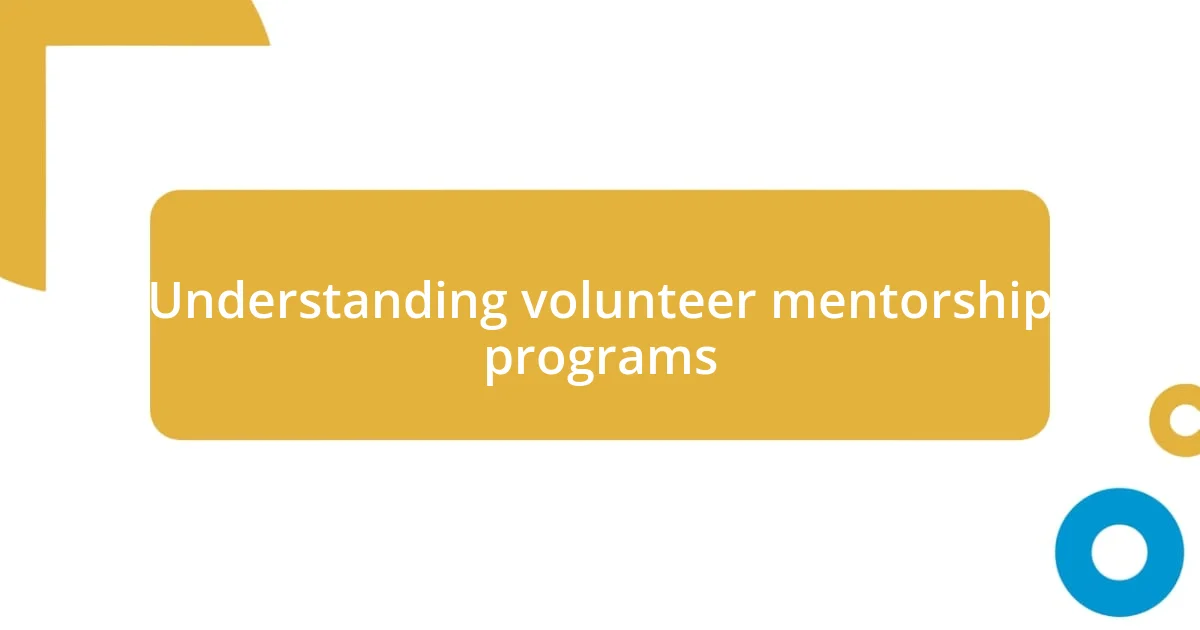
Understanding volunteer mentorship programs
Volunteer mentorship programs serve as invaluable resources for both mentors and mentees, fostering personal and professional growth. I remember my first experience as a mentor; the excitement mingled with a hint of nervousness as I realized the impact I could have on someone’s journey. Have you ever considered how a simple conversation can ignite someone’s passion or clarify their pathway?
These programs typically aim to connect individuals with more experience in a specific field or life situation to those seeking guidance. What strikes me most is the magic that happens when someone shares their struggles and aspirations, and a mentor responds with empathy and wisdom. The emotional connection formed can be transformative, often creating a lasting bond that extends beyond the program.
Participants not only share knowledge but also build confidence and resilience, learning from each other’s experiences. I often find myself reflecting on the sheer joy of watching a mentee flourish, overcoming obstacles I once faced. Isn’t it remarkable how powerful support and encouragement can turn dreams into realities?
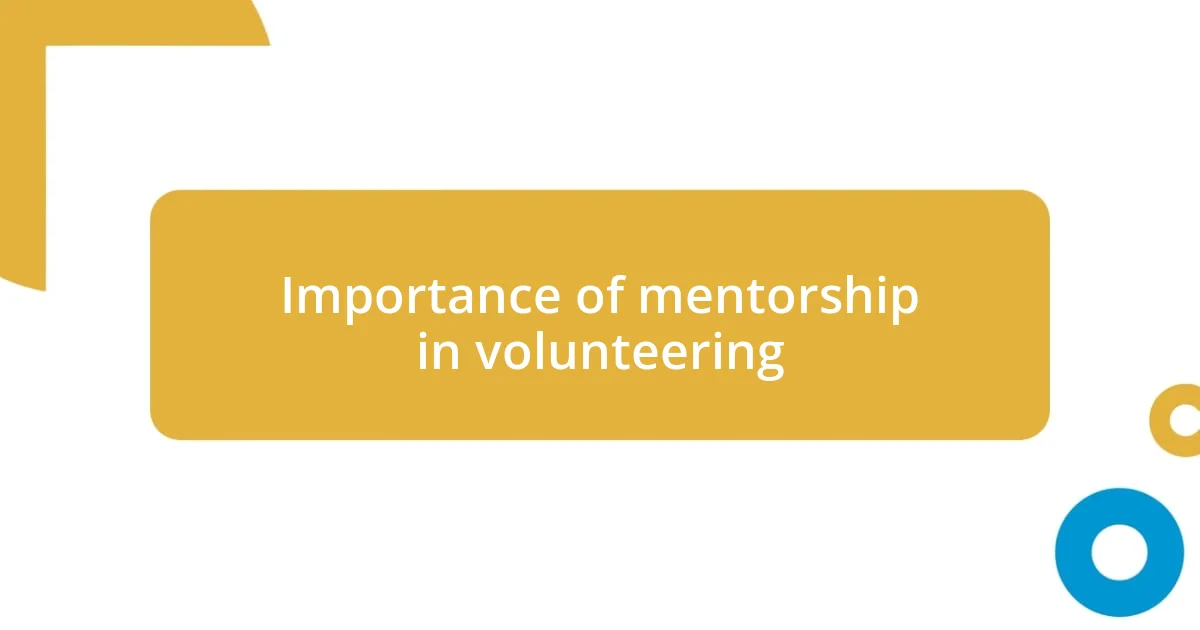
Importance of mentorship in volunteering
Mentorship within volunteering holds incredible significance, as it goes beyond mere guidance—it molds character and builds community. I recall a mentee I worked with who started the program feeling lost and unsure of her skills. Over time, as our conversations deepened, she not only discovered her strengths but also developed a genuine passion for helping others. It was rewarding to witness her transformation, which reinforced my belief in the profound impact that mentorship can have.
- Mentorship inspires confidence: A mentor’s encouragement can help a volunteer step out of their comfort zone and explore new opportunities.
- Shared experiences foster empathy: Both mentors and mentees gain a broader perspective through the stories and challenges each shares.
- Skill development: Learning from a mentor’s expertise helps volunteers enhance their skill sets and apply practical knowledge in real-world situations.
- Networking opportunities: Mentors often connect mentees to valuable contacts, opening doors that might otherwise remain closed.
- Personal growth: Engaging in meaningful mentorship encourages self-reflection, helping both parties to grow as individuals while contributing to the community.
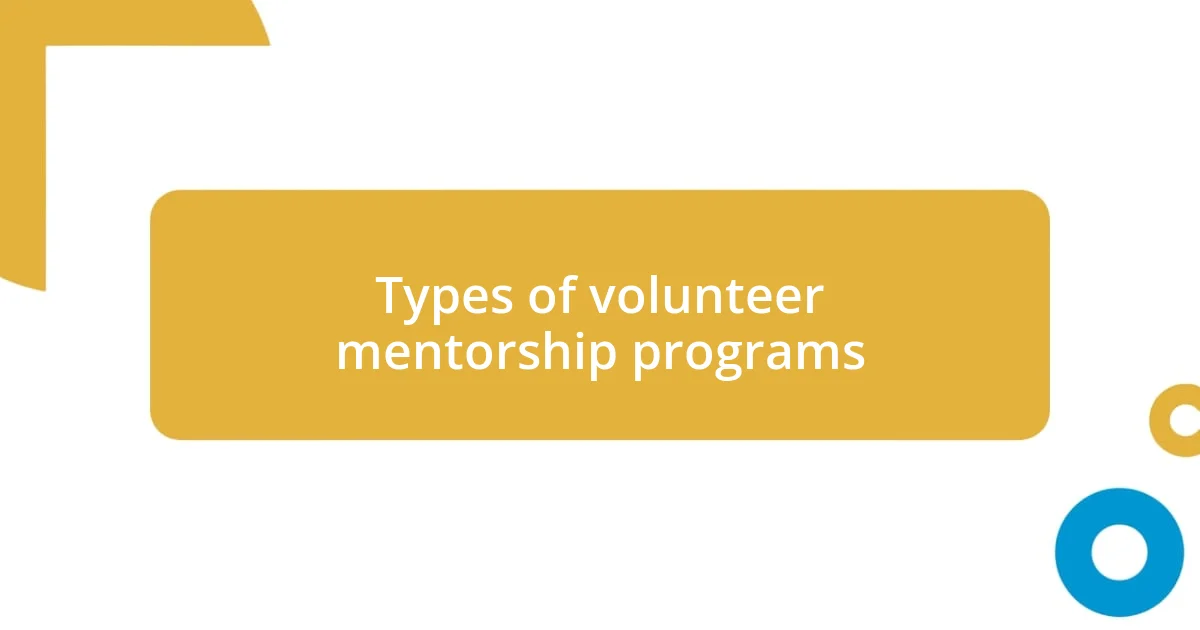
Types of volunteer mentorship programs
There are several types of volunteer mentorship programs, each designed to cater to specific needs and goals. For instance, one-on-one mentorship pairs an experienced mentor directly with a mentee, fostering a tailored and personal relationship. I recall mentoring a newcomer at a community center, where our weekly chats transformed not just his skills, but also the depth of his confidence.
Group mentoring programs provide a different dynamic, involving multiple mentees learning from a single mentor. This approach allows for shared experiences and collective growth. I’ve witnessed how vibrant discussions in a group setting lead to unexpected solutions and diverse perspectives that enrich the learning process. It’s fascinating how, when sharing the same space, individuals often resonate with each other’s stories.
Lastly, peer mentorship programs encourage a more egalitarian approach, allowing mentees to learn alongside each other. I’ve often found this model especially effective—there’s something powerful about collaborating with others who share similar challenges. It fosters an environment where support becomes a two-way street, enhancing both personal and communal growth.
| Type of Program | Description |
|---|---|
| One-on-One Mentoring | Direct, personalized guidance between mentor and mentee |
| Group Mentoring | Multiple mentees learning collaboratively from a single mentor |
| Peer Mentoring | Equal partnerships where mentees learn from and support one another |
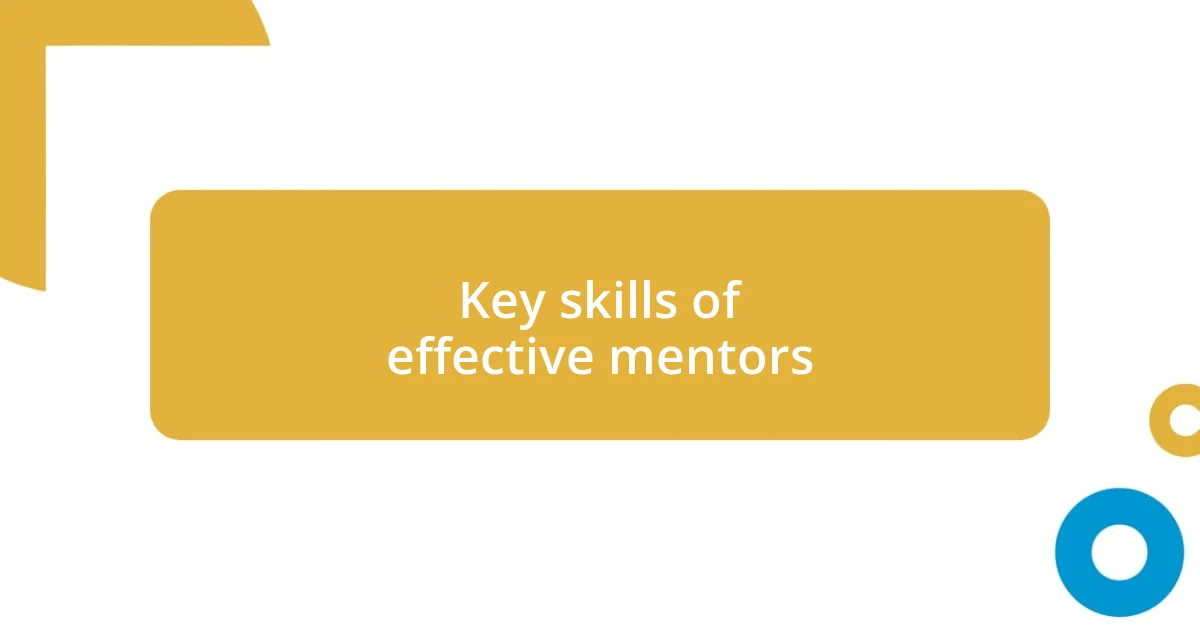
Key skills of effective mentors
One of the most crucial skills of effective mentors is active listening. It’s not just about hearing what a mentee says; it’s about truly processing those words and feelings. I once worked with a volunteer who had hesitations about her contributions. When I listened attentively, I started to recognize the underlying fears she was grappling with. This connection allowed me to tailor our discussions, making her feel valued and understood. Doesn’t it make sense that feeling heard can significantly boost a volunteer’s confidence?
Another vital skill is adaptability. I’ve encountered situations where a mentee’s needs shifted unexpectedly. For instance, I mentored a young adult who initially sought help in career development but soon revealed a desire to build soft skills. I had to pivot our focus, integrating effective communication training into our sessions. This flexibility not only enriched her learning experience but also reinforced the idea that mentorship isn’t rigid; it’s about evolving together.
Above all, empathy serves as the foundation for meaningful mentorship. I remember a time when a mentee shared their struggles with self-doubt, opening up about personal challenges that were weighing heavily on them. Instead of offering solutions right away, I chose to share my own experiences of vulnerability in similar situations. This moment of shared understanding not only strengthened our bond but also created an environment of trust and openness. Isn’t it amazing how empathy creates a safe space for growth?
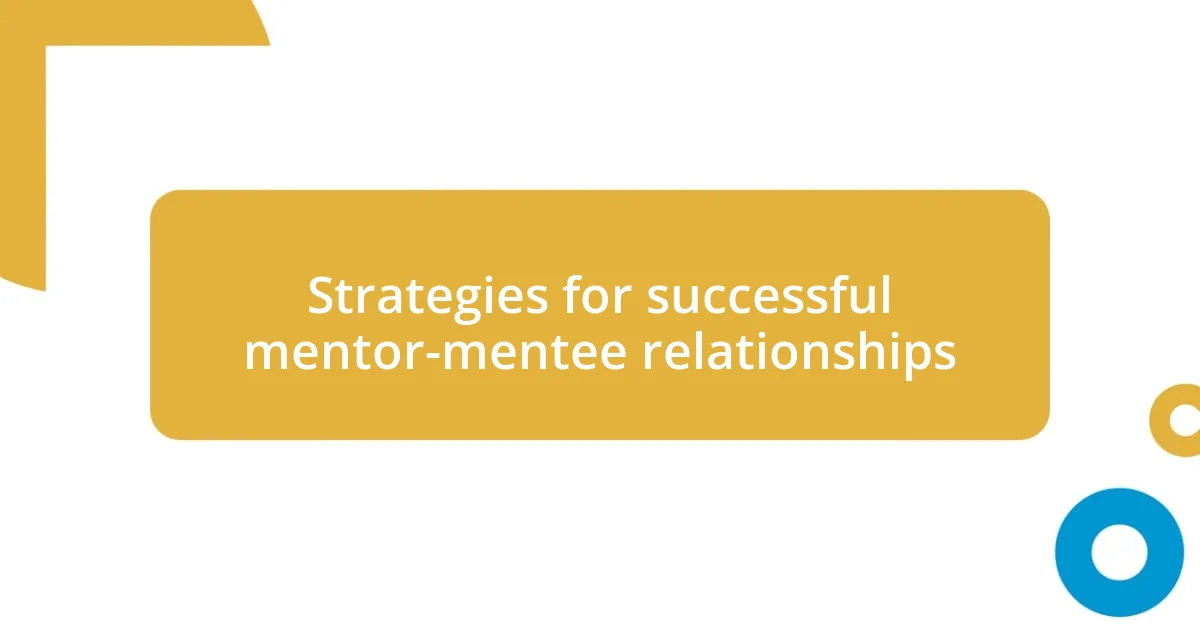
Strategies for successful mentor-mentee relationships
A vital strategy for successful mentor-mentee relationships is establishing clear expectations from the get-go. I remember a mentorship experience where we laid out our goals and communication preferences upfront. This proactive approach set a solid foundation for our relationship. Have you ever felt frustrated because you and someone else were on different pages? Clarity prevents that frustration and streamlines the path forward.
Another effective strategy is maintaining regular, open communication. I often check in with my mentees not just during scheduled sessions but also through casual messages. It’s amazing how a simple text asking about their week can strengthen our connection. Isn’t it true that consistent communication builds trust and keeps both parties engaged? Regular conversations provide a space for sharing wins, challenges, and insights, making the mentorship feel much more vibrant and dynamic.
Finally, mutual respect is essential. In my experience, treating my mentees as equals has created an enriching environment for growth. I recall a particular instance where my mentee suggested changes to our meeting format. Initially hesitant, I realized that her input reflected her growing confidence and understanding. How often do we underestimate the potential of those we mentor? By valuing their contributions, we not only empower them but also enrich our own perspectives and learning journey.
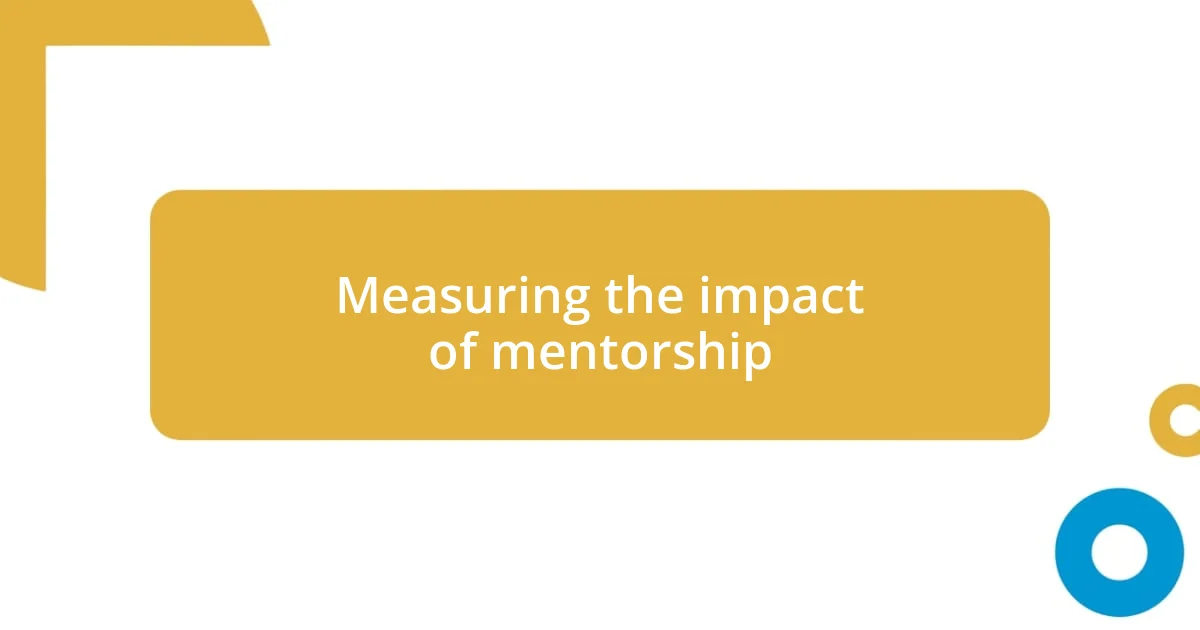
Measuring the impact of mentorship
Measuring the impact of mentorship can be a nuanced process. In my experience, one of the most straightforward ways to gauge success is through feedback. After one mentorship cycle, I conducted anonymous surveys, asking my mentees how they felt about their growth. The relief and joy in their words were unmistakable—many shared they felt more confident and equipped to face challenges. Isn’t it heartening to think that just a few guided conversations can ignite such profound change?
Another metric I’ve found invaluable is tracking specific goals set at the beginning. For example, I once had a mentee who wanted to improve her public speaking skills. We established clear milestones, and over time, I noticed her progress wasn’t just reflected in her ability to present but also in her newfound willingness to advocate for herself in meetings. Doesn’t achieving those tangible goals reinforce the very essence of mentorship—empowering individuals to realize their potential?
Finally, I firmly believe that impact can also be measured through the ripple effects of mentorship. I remember mentoring a young man who, after our sessions, felt inspired to start his own volunteer initiative. Witnessing him encourage others sparked a realization: mentorship isn’t just about one-on-one growth; it’s about creating a community of support. When I see my mentees uplift others, it warms my heart and strengthens my commitment to the mentorship journey. Isn’t it amazing how mentorship can create a chain reaction of positivity and growth?














